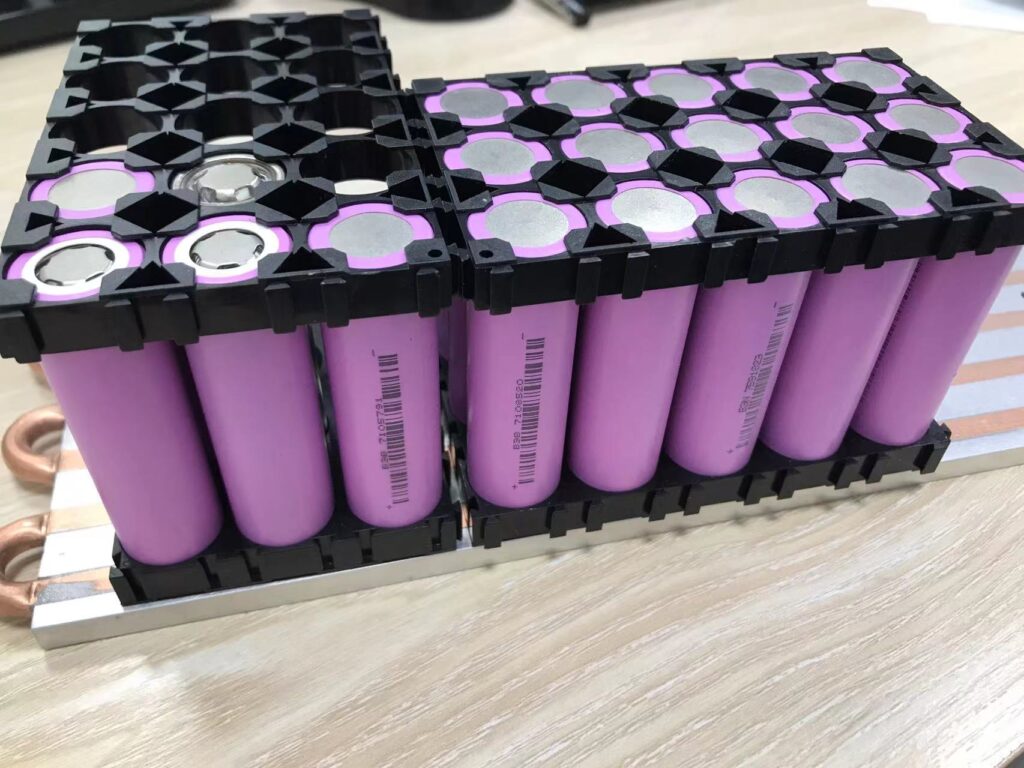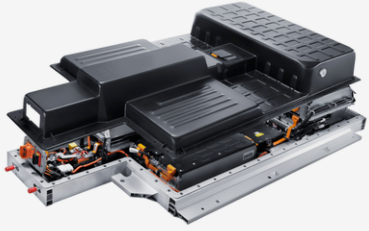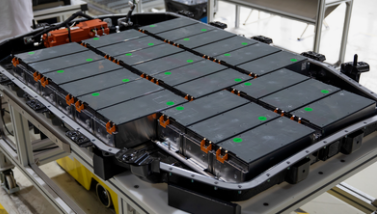
Modular production of 18650 lithium batteries, solving the thermal management system with heat sink or liquid cold plate is the first choice for electric vehicles. 18650 is the originator of lithium-ion batteries – a standard lithium-ion battery model set by Japan’s SONY Company in order to save costs, where 18 indicates a diameter of 18mm, 65 indicates a length of 65mm, and 0 indicates a cylindrical battery.
Common 18650 batteries are divided into lithium-ion batteries and lithium iron phosphate batteries. The voltage of lithium ion battery is 3.7v nominal voltage, the charging cut-off voltage is 4.2v, the nominal voltage of lithium iron phosphate battery is 3.2V, the charging cut-off voltage is 3.6v, the capacity is usually 1200mAh-3350mAh, the common capacity is 2200mAh-2600mAh.
18650 lithium battery use:
The 18650 battery life theory is 1000 cycles of charging. Due to the large capacity per unit density, most of them are used in notebook computer batteries. In addition, because 18650 has very good stability at work, it is widely used in major electronic fields: commonly used in high-end strong light flashlights, portable Power supplies, wireless data transmitters, electric thermal clothing, shoes, portable instruments and meters, portable lighting equipment, portable printers, industrial instruments, medical instruments, etc.
18650 lithium battery advantages:
1. The capacity of 18650 lithium battery is generally between 1200mah and 3600mah, and the general battery capacity is only about 800mah. If combined into a 18650 lithium battery pack, the 18650 lithium battery pack can easily exceed 5000mah.
2. Long service life The 18650 lithium battery has a long service life, and the cycle life can reach more than 500 times during normal use, which is more than twice that of ordinary batteries.
3. High safety performance 18650 lithium battery has high safety performance, no explosion, no burning; non-toxic, non-polluting, certified by RoHS trademark; various safety performances are completed in one go, the number of cycles is more than 500 times; high temperature resistance performance is good, under the condition of 65 degrees The discharge efficiency reaches 100%. In order to prevent the short circuit of the battery, the positive and negative electrodes of the 18650 lithium battery are separated. Therefore, the possibility of short-circuiting has been reduced to the extreme. A protection board can be added to avoid overcharging and overdischarging of the battery, which can also prolong the service life of the battery.
4. High voltage The voltage of 18650 lithium battery is generally 3.6V, 3.8V and 4.2V, which is much higher than the 1.2V voltage of nickel-cadmium and nickel-hydrogen batteries.
5. There is no memory effect. It is not necessary to empty the remaining power before charging, which is convenient to use.
6. Small internal resistance: The internal resistance of the polymer battery is smaller than that of the general liquid battery. The internal resistance of the domestic polymer battery can even be below 35mΩ, which greatly reduces the self-consumption of the battery and prolongs the standby time of the mobile phone. In time, it can fully reach the level in line with international standards. This polymer lithium battery that supports large discharge current is an ideal choice for remote control models, and has become the most promising product to replace nickel-metal hydride batteries.
7. It can be combined in series or in parallel to form a 18650 lithium battery pack.

Disadvantages of 18650 lithium battery:
The biggest disadvantage of the 18650 lithium battery is that its volume has been fixed, and it is not very well positioned when installed in some notebooks or some products. Of course, this disadvantage can also be said to be an advantage, which is compared to other lithium batteries such as polymer lithium batteries. This is a disadvantage in terms of customizable and resizable. Compared with some products with specified battery specifications, it has become an advantage. Generally speaking, this kind of small module combination does not require a water cooling plate or a heat sink to thermally manage the battery module.
Because there is not a lot of heat transfer during charging and discharging use.
The 18650 lithium battery is prone to short circuit or explosion, which is also relative to the polymer lithium battery. If it is relatively ordinary batteries, this disadvantage is not so obvious.
18650 lithium battery production requires protection circuits to prevent the battery from being overcharged and causing discharge. Of course, this is necessary for lithium batteries, which is also a common drawback of lithium batteries, because the materials used in lithium batteries are basically lithium cobalt oxide materials, and lithium batteries made of lithium cobalt oxide materials cannot be discharged at large currents, and their safety poor.
18650 lithium battery requires high production conditions. Compared with general battery production, 18650 lithium battery has high requirements for production conditions, which undoubtedly increases the production cost. At the same time, the modular production and the series connection of batteries also put forward high requirements for the heat dissipation production equipment of the shell. Generally, the heat dissipation system of the battery is an aluminum water-cooled plate. The production of this water-cooled plate requires a vacuum brazing furnace. Or under nitrogen protection conditions, high-quality water-cooled panels can be produced.
2. Introduction of soft pack lithium battery
Soft-pack lithium batteries are just liquid lithium-ion batteries covered with a polymer shell. The structure is packaged with aluminum-plastic film. In the event of a safety hazard, the soft-pack battery will only bulge and crack at most.
Advantages of soft pack batteries:
1. Good safety performance
Soft-packed batteries, unlike steel-cased aluminum-cased batteries, which will explode.
2. Light weight
The weight of the soft pack battery is 40% lighter than that of the steel case lithium battery of the same capacity, and 20% lighter than that of the aluminum case battery.
3. Large capacity
The capacity of the soft-pack battery is 10-15% higher than that of the steel-shell battery of the same size, and 5-10% higher than that of the aluminum-shell battery.
4. Small internal resistance
The internal resistance of the soft pack battery is smaller than that of the lithium battery. At present, the minimum internal resistance of the domestic soft pack battery cell can be less than 35mΩ, which greatly reduces the self-consumption of the battery.
5. Flexible design
The shape of the soft pack battery can be customized according to the needs of customers, and new cell models can be developed.

Disadvantages of soft pack battery:
There are few models of existing soft-pack battery cells, which cannot meet the market demand;
Developing new models is expensive.
3. Who is more suitable for electric vehicles between 18650 lithium batteries and soft pack batteries
Both world-renowned electric vehicle brands have different choices for power batteries? In the field of automotive power battery applications, what are the advantages and disadvantages of 18650 lithium batteries and soft pack batteries?
Electrolyte morphology is the key
As two mainstream power batteries on the market at present, 18650 batteries and lithium polymer soft pack batteries are distinguished according to the shell packaging material. The 18650 battery is generally packaged in a steel casing (18 means a diameter of 18mm, 65 means a length of 65mm, and 0 means a cylindrical battery), and the structure of the internal electrode sheet and the diaphragm is wound. The outer packaging of the lithium polymer soft pack battery is made of aluminum-plastic film, and the inner electrode sheet and the separator are laminated (stacked layer by layer).
Although the shape and internal structure are different, the principle of these two batteries is basically the same. Both batteries have a positive electrode, a negative electrode and an electrolyte. The positive electrode material is generally lithium cobalt oxide, nickel cobalt lithium manganate (ternary material), lithium iron phosphate or lithium manganite, etc. The negative electrode material is generally graphite, and the electrolyte is Lithium hexa fluoropho sphate solution.
The main difference between the two lies in one of the internal materials of the battery, the shape of the electrolyte: the electrolyte inside the lithium polymer soft pack battery is a polymer, which is generally gel or solid, while the electrolyte inside the 18650 battery is generally liquid.
Each has advantages and disadvantages Different application fields
18650 lithium battery and lithium polymer soft pack battery have their own advantages and disadvantages. At present, the 18650 battery has a high degree of automation, and the consistency and safety of the battery have reached a high level. In addition, the battery itself is small in size and light in weight, so it has unique advantages in the modularity and standardization of system development. Many people believe that the use of 18650 batteries as the source of power for new energy electric vehicles is the best choice at this stage.
However, the 18650 battery also has an unavoidable disadvantage, that is, the unit capacity is low (generally around 2~4Ah). This makes the number of batteries required for the 18650 battery to be very large, and the battery management system to maintain the consistency of the cells and the heat dissipation of the battery is more complicated. Using the heat dissipation mode of the brazed water-cooled plate, it is more and more important to use the program to control the thermal management of the battery, which corresponds to the heating of the battery during charging and the start-up control in the low temperature mode. Now this technology is more and more mature, so the modular battery The package is the development direction of the power battery in the future.
Compared with the 18650 battery, the lithium polymer soft pack battery has a higher single capacity, and has the advantages of thinning, arbitrary area and arbitrary shape (it can produce ultra-thin batteries of 0.33mm, 0.50mm, etc.) , its main disadvantages are poor consistency and poor mechanical strength. Based on the characteristics of lithium polymer soft pack batteries, lithium polymer soft pack batteries are increasingly being used in mobile phones, notebook computers, mobile power supplies and other fields. However, due to the poor conductivity and high internal resistance of colloidal (or solid) electrolytes, lithium polymer soft pack batteries are rarely used in electric vehicles.
